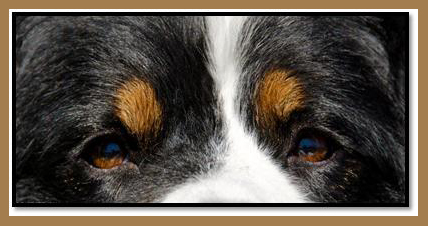When to Visit a Veterinary Ophthalmologist
by Nancy Kay, DVM
 This is the first in a series of blog posts that I hope will help you determine when your four-legged family member might benefit from a visit with a veterinary specialist. Be reminded, veterinarians cannot refer to themselves as a “specialist” without some major credentials under their belts.
This is the first in a series of blog posts that I hope will help you determine when your four-legged family member might benefit from a visit with a veterinary specialist. Be reminded, veterinarians cannot refer to themselves as a “specialist” without some major credentials under their belts.
Let’s begin with ophthalmology. Veterinarians who specialize in ophthalmology have truly paid their dues in terms of time spent learning about animal eyeballs! All that effort is certainly rewarded. Every workday they get to use super cool equipment and perform highly technical surgical procedures. Animals needing cataract surgery or treatment for glaucoma or retinal detachments are no problem for these specialists!
When should your pet be evaluated by a board certified veterinary ophthalmologist? I strongly encourage you to consider this when:
To find a board certified veterinary ophthalmologist in your community or learn more about this specialty, visit the American College of Veterinary Ophthalmologists.
CREDIT:
Dr. Nancy Kay, DVM Diplomate, American College of Veterinary Internal Medicine.
Recipient, American Animal Hospital Association 2009 Animal Welfare and Humane Ethics Award Recipient, 2009 Dog Writers Association of America Award for Best Blog Recipient, 2009 Eukanuba Canine Health Award
 Author of Speaking for Spot: Be the Advocate Your Dog Needs to Live a Happy, Healthy, Longer Life
Author of Speaking for Spot: Be the Advocate Your Dog Needs to Live a Happy, Healthy, Longer Life
Website: http://speakingforspot.com
Spot’s Blog: "http://www.speakingforspot.com/blog
Email: dr.kay@speakingforspot.com
Become a Facebook Fan: Facebook Fan - Nancy-Kay
 This is the first in a series of blog posts that I hope will help you determine when your four-legged family member might benefit from a visit with a veterinary specialist. Be reminded, veterinarians cannot refer to themselves as a “specialist” without some major credentials under their belts.
This is the first in a series of blog posts that I hope will help you determine when your four-legged family member might benefit from a visit with a veterinary specialist. Be reminded, veterinarians cannot refer to themselves as a “specialist” without some major credentials under their belts.Let’s begin with ophthalmology. Veterinarians who specialize in ophthalmology have truly paid their dues in terms of time spent learning about animal eyeballs! All that effort is certainly rewarded. Every workday they get to use super cool equipment and perform highly technical surgical procedures. Animals needing cataract surgery or treatment for glaucoma or retinal detachments are no problem for these specialists!
When should your pet be evaluated by a board certified veterinary ophthalmologist? I strongly encourage you to consider this when:
Eye surgery has been recommended for your pet. Why not get a second opinion from someone who performs no surgery other than eye surgery, and has probably performed what has been recommended for your pet gazillions of times? Your pet has an eye issue that isn’t getting any better or is getting worse in spite of therapy prescribed by your family veterinarian. You simply want to be more certain about the advice you’ve received from your family veterinarian. Your pet has sustained a significant eye injury. Your pet is losing vision or has abruptly become blind. Your pet has a chronic condition such as glaucoma (increased pressure within the eye) or dry eye (decreased tear production). The specialist will be aware of cutting edge technologies for treatment of such diseases. Your pet has diabetes mellitus (sugar diabetes). Dogs and cats with diabetes are prone to cataract formation (the normally translucent lenses within the eyes become opaque). Additionally, diabetic animals can develop uveitis (inflammation within the eye) that is difficult to detect without specialized equipment. The ophthalmologist can determine if your pet has uveitis and will outline an appropriate treatment plan. Additionally, the specialist can help determine if cataract surgery makes sense for your pet. Your pet’s breed is prone to a particular type of eye disease. For example, Bassett Hounds are predisposed to glaucoma. Consider a visit to the ophthalmologist to establish a baseline examination and determine how frequently your precious poopsie should be evaluated in the future. You are a breeder and the breed you fancy happens to be predisposed to an inherited form of eye disease. Be sure that every eyeball of every potential dam and sire is screened by a veterinary ophthalmologist prior to breeding.
To find a board certified veterinary ophthalmologist in your community or learn more about this specialty, visit the American College of Veterinary Ophthalmologists.
CREDIT:
Dr. Nancy Kay, DVM Diplomate, American College of Veterinary Internal Medicine.
Recipient, American Animal Hospital Association 2009 Animal Welfare and Humane Ethics Award Recipient, 2009 Dog Writers Association of America Award for Best Blog Recipient, 2009 Eukanuba Canine Health Award
 Author of Speaking for Spot: Be the Advocate Your Dog Needs to Live a Happy, Healthy, Longer Life
Author of Speaking for Spot: Be the Advocate Your Dog Needs to Live a Happy, Healthy, Longer LifeWebsite: http://speakingforspot.com
Spot’s Blog: "http://www.speakingforspot.com/blog
Email: dr.kay@speakingforspot.com
Become a Facebook Fan: Facebook Fan - Nancy-Kay
